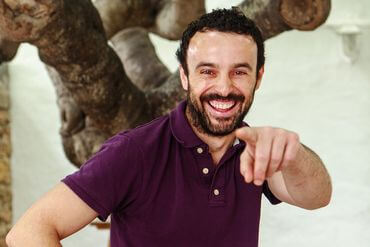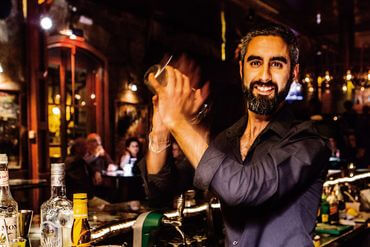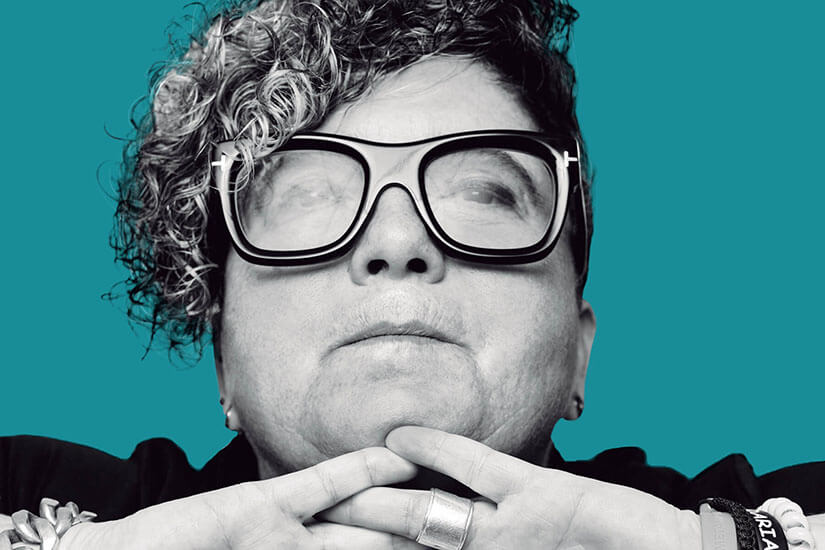
Charo Val
A native of Ágreda (a town in Soria with barely 3000 inhabitants), Charo Val tasted freedom while still a small child, and when she grew up, she made that freedom a way of life. A travelling chef and self-made businesswoman, she set up her catering service company, Alacena del Gourmet, in 2006. She has represented Spain as a speaker at the United Nations with her project on sustainable cooking. She won the Gourmand Prize for the best cookbook of 2014. In addition, she is a member of Euro-Toques, a spokesperson for the ASCAIB [the Balearic Islands Association of Chefs], a member of ACYRE Madrid [Association of Chefs and Confectioners], and a member of FACYRE Spain [Federation of Chefs and Confectioners Associations]. And she still finds the time to play an active part in all manner of social and charitable causes. She has devoted her life to gastronomy and in the past few years, Charo Val and her team have made the oyster the central motif of their cooking, creating around it all sorts of ground-breaking dishes.
Chef, businesswoman… how do you think of yourself professionally?
I still think of myself as a chef, but nowadays my objective is to be a first-class entrepreneur and a better businesswoman. I have developed considerably as a professional, and cooking has been one step further along the way to my goal. What I have today is the result of 20 years of continuous work. That is why I don’t have a family. I have devoted myself fully to this, and my profession has been my life.
What is Charo Val like—inside and outside work?
I am a faithful person in all senses of the word: loyal and conscientious. In my work, I can resort to military action if I have to. I am very demanding, and I always have clear objectives. I am passionate about travelling. Travelling has made me a better person, and has given me the status I have today. As a child, I practised martial arts, and I learned a great deal from that: precision, control, work, discipline, perseverance…
In my work, I can resort to military action if I have to. I am very demanding, and I always have clear objectives
In 2014, you won the Gourmand Prize for the best cookbook…
Together with PEFC Spain [Programme for the Endorsement of Forest Certification], which is a non-profit association for the protection of woodland and nature, we undertook a series of activities to show catering schools the potential flavours that could be extracted from woodland. Within that framework, we travelled to Geneva and wrote a cookery book, “El bosque en tu paladar” [“The forest on your palate”]. The book includes a technical section entitled “the woodland pantry”. In it, we talk about seasonality and organoleptic properties. We take each of the raw ingredients and analyse them one by one: season, conservation, how to introduce them into cooking, etc. Being awarded the prize gave us the opportunity to go to the UN and present our sustainable cooking project.
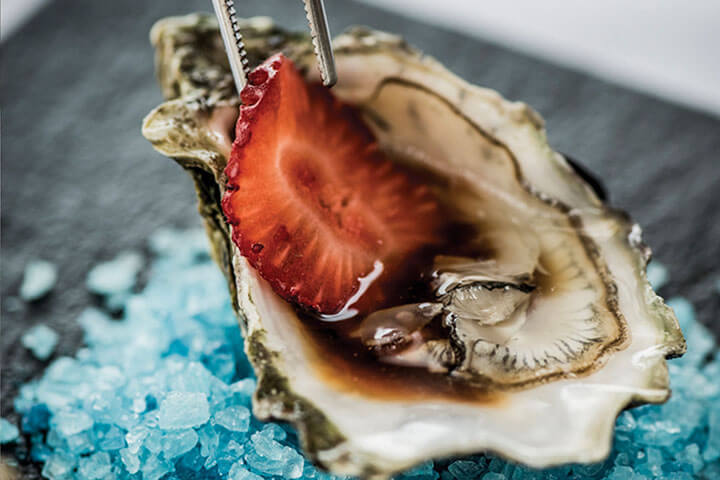
Oyster & strawberry
Your work representing Spain at the UN marked a ‘before’ and an ‘after’ in your career…
Yes, of course. It made me really conscious of reality, of where we were going. Seven years ago, we decided (along with PEFC Spain) to create a brand that would encompass all the flavours and foods that could be extracted from woodland. We presented a project on the potential for sustainable cuisine, and then went to explain it at the UN. The subject of ecology is not just a fashion for me: it is a matter of conscience. My entire family works wholeheartedly for nature conservation. I have grown up in this environment and I have brought it to my professional sphere in this way.
How much further does the Spanish catering sector need to progress before it begins to become truly sustainable?
Sustainability is no longer a utopia: it is a reality. Five years ago, we were at the UN with our presentation on sustainable cooking, and nobody in Spain was listening to us. Then, within a short space of time, chefs began to emerge as “ambassadors” of sustainable cooking. That is fantastic, but our aim was to awaken consciousness. Over the past six years, we have half killed ourselves visiting catering schools, restaurants and hotels, meeting the press… talking about sustainability. Finally, it seems that people are showing a degree of interest and beginning to contribute something.
And are the small restaurants also beginning to sign up to sustainability?
It doesn’t depend on the size of the restaurant, but on the level of consciousness of the person who calls the shots. If you are conscious about recycling, your staff will practise recycling because it is what you require. We bring people around to our way of working, our way of living.
What three key pieces of advice would you give to a restaurant manager for making their business sustainable?To be sustainable, you need to comply with three requirements: the first, of course, is to be respectful of the environment, the second is to practise economy, and the third is to promote rural development, to prevent towns and villages from dying. My aim over the past few years has been to help small producers find a market. To promote rural gastronomic tourism, and to encourage the market to attach a greater value to the origins of the raw ingredients. Ibiza is a window on the world, and this has enabled me to help those small producers to open up a market.
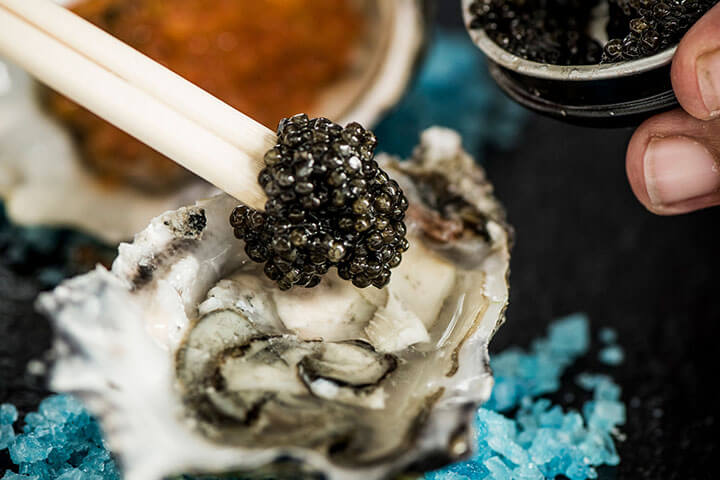
Oyster & caviar Cala Bassa Beach Club
Let’s talk about oysters… When did the oyster boom take off in Spain?
I believe that oysters have now become a popular food item. Over the past year, more or less. Suddenly, all the haute cuisine restaurants have oysters.
They can give you Michelin stars, Repsol Suns… whatever you like. But my aim is to optimise the profit-and-loss account and to eliminate revenue loss
Why are you “the oyster kings”?
Because we have an awareness of the product and we have established it as a menu item on this island. We have created an evolutionary movement around this particular raw ingredient, making truly amazing gastronomic wonders using the oyster as a raw ingredient. We use them hot or cold, combined with short drinks, with cocktails, with molecular cuisine techniques (airs, mock caviars, and spherifications), ceviches, tartares, etc.; we have even used them in desserts. We try always to be in the vanguard. We’re very proud to have been a part of this because, until very recently, there were only three places in Ibiza where you could eat oysters. You had to go to a seafood restaurant, and once there, you’d only have one option.
Where in Ibiza can we find your services?
At Cala Bassa Beach Club, at the three Deeva de Port des Torrent restaurants, and at Café del Mar. But the oysters at Café del Mar are not the same as those at Cala Bassa or those at Port des Torrent.
What are you most proud of?
Of being where I am now, and most of all, of having achieved our goal in all our lines of business with zero loss of revenue—along with sustainability and a super-healthy profit and loss account. They can give you Michelin stars, Repsol Suns… whatever you like. But my aim is to optimise the profit-and-loss account and to eliminate revenue loss.
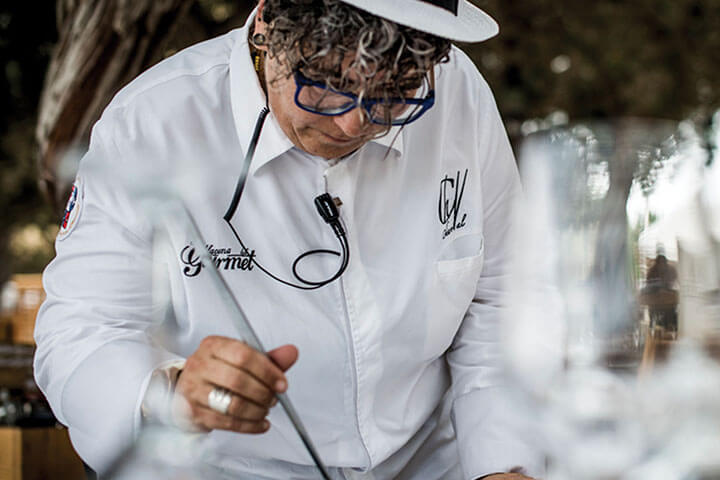
Charo Val Cala Bassa Beach Club




